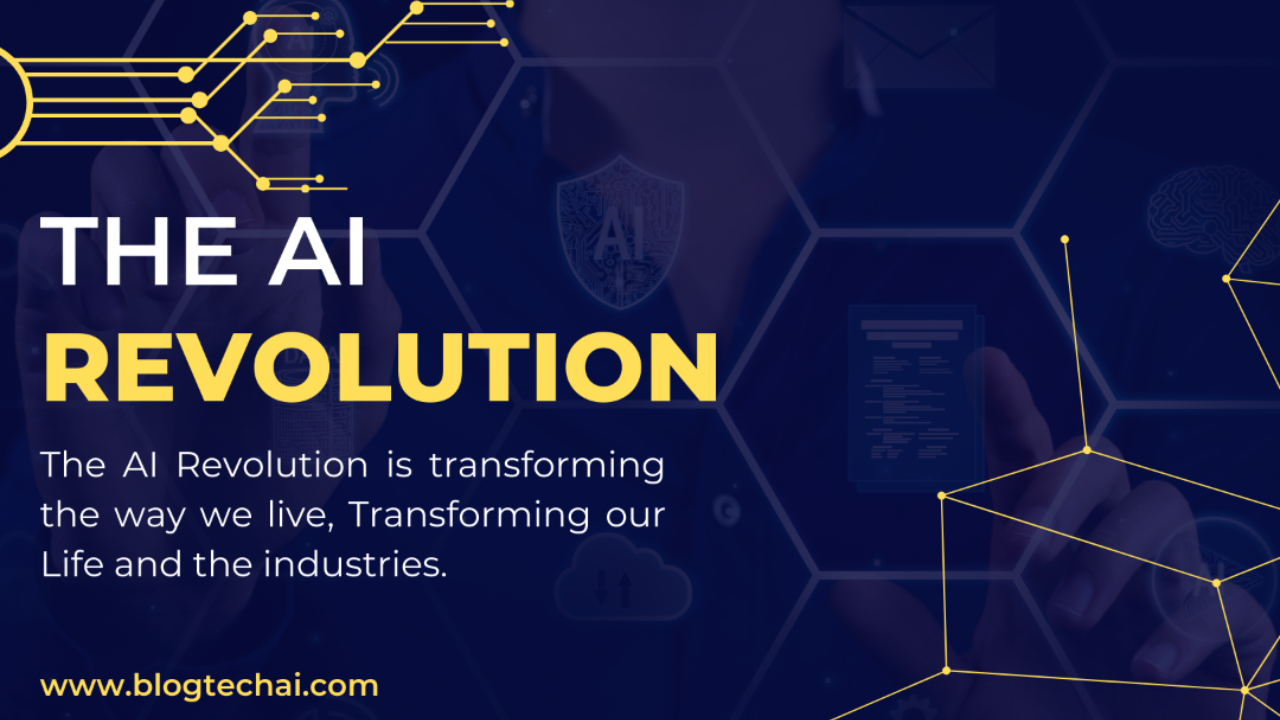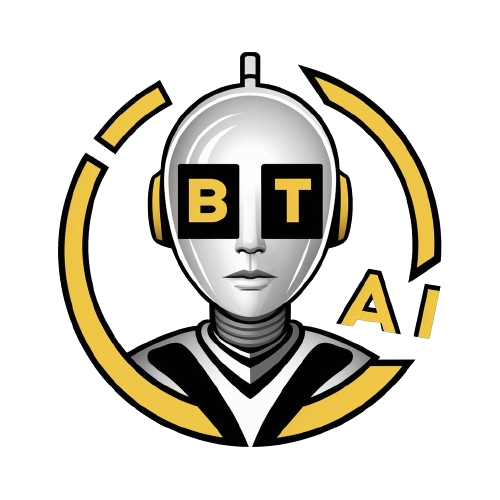The AI Revolution: Transforming our Life and the industries.
Introduction
The AI revolution is the biggest ever technological shift in now days, changing everything in every field, The way we live, work and interact with the world around us. We are seeing big changes across many different companies with advanced in artificial intelligence (AI) technology with the ability to make an positive impact in the fields of health, transportation, financial sector and entertainment. In this comprehensive blog, we will explore the many trends related to the AI revolution, its benefits, challenges, and ethical considerations.
What is the AI Revolution?

If you consider artificial intelligence to be digital evolution then the AI revolution is the process of consuming and integrating artificial intelligence into daily life and industry in a scarily quick way. AI refers to underlying technologies such as Machine learning, Natural Language Processing, Robotics & Computer Vision, to name a few all of which try to think like humans. This is not just a change in technology for making smarter machines, it is a means of improving human capacity, and increasing efficiency in all realms. If you want to learn algorithm of How AI Works then read our complete article https://blogtechai.com/how-human-ai-works/
1. AI Revolution: Key Trends Driven
Automation
The automation is one of the best effects of AI. Automation has been around for a while, but AI is pushing automation to new rank. Now days, AI is used by the business person more and more to handle repetitive tasks, streamline operations, and cut down on the rate of labour.
Examples of Automation in Action:
- Manufacturing: Production lines are optimized by robotics and AI algorithms to make the processes more efficient and accurate.
- Customer Service: Virtual assistants and chatbots answer customers’ inquiries, quickly, and make kind agents available to graver problems.
Machine Learning
Machine learning (ML), a subfield of AI, is the art and science of using data, model development, and computational statistics to build algorithms that learn from data and without explicit programming attempt to improve performance when possible. Most of the AI applications we have today rely on ML.
Applications of Machine Learning:
- Recommendation Systems: Netflix and Amazon use ML to analyze user behavior and to recommend content or products.
- Predictive Analytics: The usage of ML for trend forecasting has evolved beyond stock market trends, to forecasting consumer buying habits.
Natural Language Processing (NLP)
Because of NLP, the machines can understand and interpret human language and they can take part in conversations, analyze sentiments, and even generate text.
Applications of NLP:
- Voice Assistants: NLP is used by Siri, Alexa and Google Assistant for understanding user commands.
- Sentiment Analysis: One use of NLP is for companies to study the public opinion on social media platforms.
Computer Vision
Computer vision is the ability of machines to perceive and understand visual information in your environment, a primitive but powerful ability in applications that have ranges from self driving cars to facial recognition.
Examples of Computer Vision Use Cases:
- Autonomous Vehicles: Using computer vision, AI is able to navigate and makes real time driving decisions.
- Healthcare Imaging: Medical images are analyzed by AI algorithms to help with diagnostics, and treatment planning.
2. Benefits of the AI Revolution
Increased Efficiency
The use of AI technologies helps to boost the rate of work and help them to achieve in specific time. It earns them significant time and cost saving for businesses.
Improved Decision-Making
A company can make data driven decisions through AI’s ability to analyze wide amount of data. It’s used for predicting market trends which allows businesses to change their strategy in respect to the trends.
Increased Customer Experience
Key Benefit of AI is Personalization. With the analysis and data, businesses can tailor their offerings and communications with information to give a better customer satisfaction and relationship.
New Opportunities and 4 Innovation
Innovation is revolutionizing the industries with the AI revolution. There is a lot happening in the arrival of new AI driven products and services, which both established companies and startups can benefit from.
3. Industry Applications of AI
Healthcare
Healthcare has become the next biggest industry for AI to replace the blue collars with the white collars, by improving diagnostics, personalisation of treatment plans and streamlining administrative tasks.
Key Applications in Healthcare:
- Diagnostics: Medical images are analysed by AI algorithms to diagnose cancer earlier and more accurately than human experts.
- Telemedicine: Remote consultations are made possible by AI powered platforms which make healthcare much more accessible.
Finance
In the world of finance, AI brings fraud detection, risk management and improving customer service.
Examples of AI in Finance:
- Fraud Detection: But, in real time, machine learning algorithms identify suspicious transactions.
- Algorithmic Trading: Market data analysts use AI to execute faster trade than a human can.
Transportation
On the other hand, AI is very much changing the transportation industry especially in logistics and autonomous vehicles.
Key Trends in Transportation:
- Self-Driving Cars: A.I. such as using AI for navigation and safety is being developed by companies like BMW and KIA to build autonomous vehicles.
- Logistics Optimization: Through supply chain management, AI clusters routes and shortens delivery time.
Retail
Retail is being shaken by AI in inventory management, customer experience and how your brand markets itself to customers.
Applications of AI in Retail:
- Inventory Management: AI predicts demand, and optimizes STOCK levels which resulted in less waste and out of stock situation.
- Personalized Marketing: An analysis of customer behavior is done using AI and targeted advertising campaigns are created.
4. Ethical and Challenges
Context
Several challenges and ethical considerations are discussed throughout this thesis.
Job Displacement
Job displacement is easily one of the most pressing concerns of the revolution in AI. The economic challenge to individuals whose job has become obsolete due to the trend of automation.
Data Privacy and Security
As AI develops, there’s a problem of data privacy. If personal data is being processed, organizations must make sure that we do this responsibly and in compliance with regulations such as GDPR.
Bias and Fairness
Inadvertently, AI can strengthen biases found in the training data. It’s important to make sure AI algorithms aren’t discriminating.
Accountability
When AI systems start becoming increasingly autonomous, we raise questions of accountability. It’s really difficult to identify who is responsible for the decisions taken by AI (be it the developers, the organisation or the AI itself).
5. The Future of AI
Continued Innovation
Data from the AI revolution will continue to evolve with ongoing research and development that one day will result in even more sophisticated applications. Further data on emerging technologies that may further improve AI including quantum computing could be added.
Technologies Integration
As AI continues to integrate with other technologies like Internet of things (IoT) and blockchain new potential and efficiencies will arise.
Workforce Transformation
Future of work comprises of a relationship between humans and AI. As workers adjust to AI enabled roles, upskilling and reskilling will be important too.
Conclusion
The AI revolution is an incredible a disruptive force down to how we live technologies that bring both amazing opportunities and thorny problems. If we know the leading trends, the biggest benefits and ethical considerations of AI we can handle this new terrain appropriately. With the coming of artificial intelligence as we know it, we must maintain the distinctions between innovation and ethics to guarantee that artificial intelligence serves as a means of advancing change, not of destructive nature.
F.A.Qs
1. What is the AI revolution?
Artificial intelligence revolution is the advancement in artificial intelligence technology that is pushing the extents of the industries, are improving the daily life, and reshaping the career itself.
2. What industries are using AI for?
From automation, data analysis, customer service (like chatbots), predictive analytics and product personalization, there are myriad industries in which AI generates business value. Healthcare, finance, transportation and retail sectors are particularly hit.
3. Will AI take away jobs?
Some say that AI will replace certain jobs, while others think that AI will create new jobs as well. But in my opinion AI made work easy in every filed along with the AI technologies.
